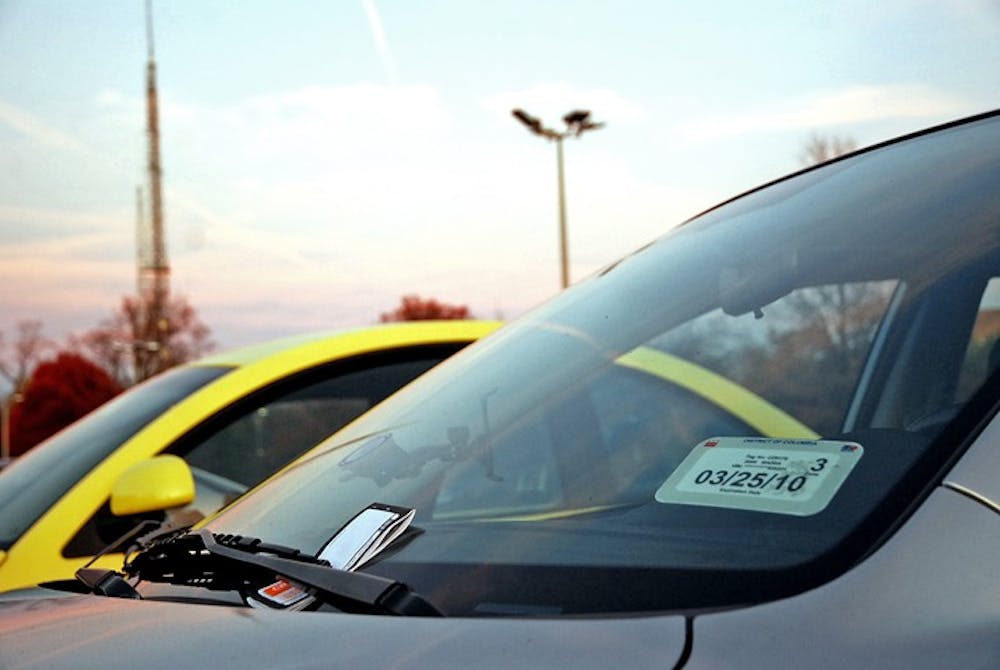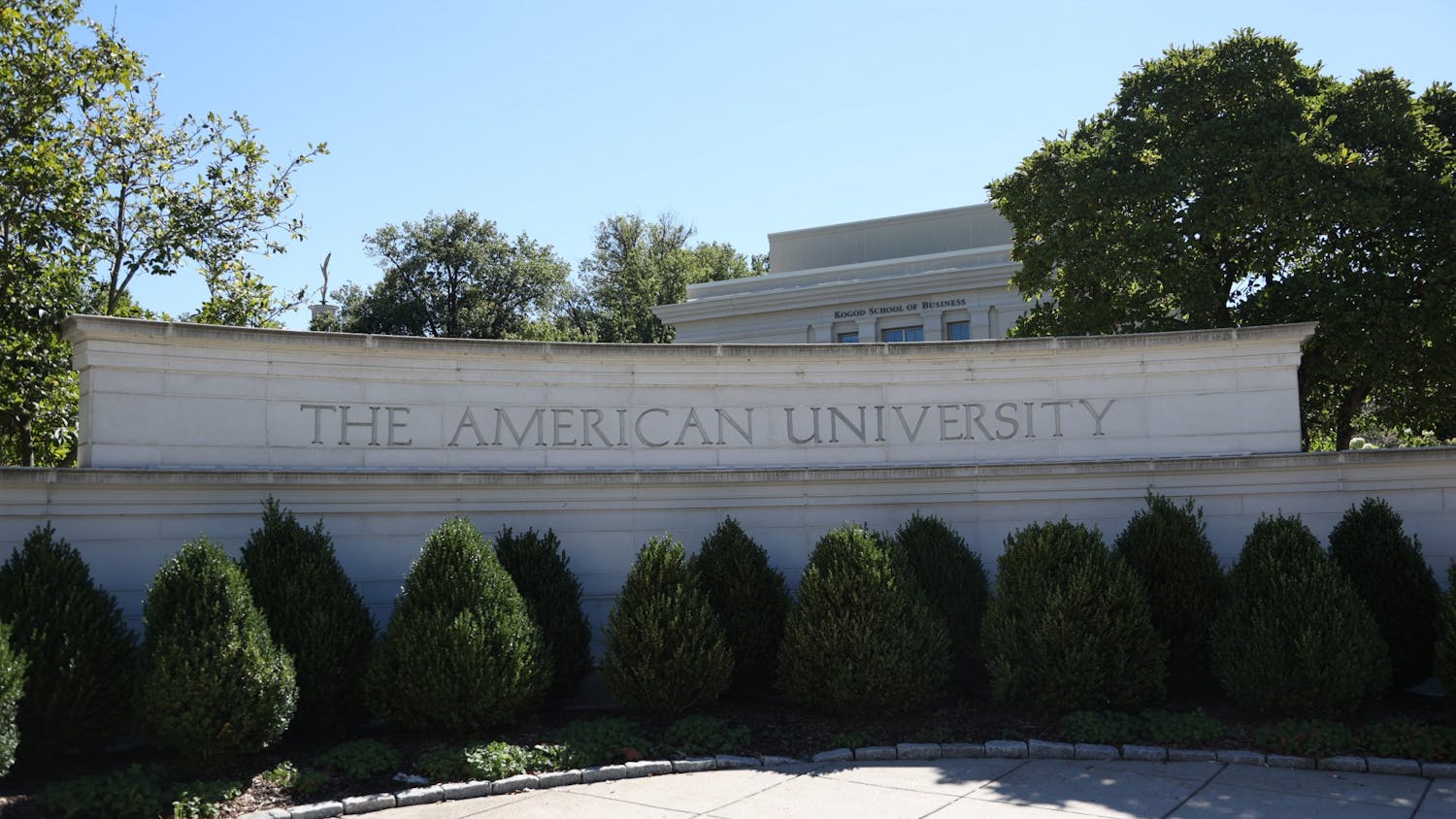One AU student knew the risks of parking on the street but decided to chance it anyway. Another thought he was in the clear after purchasing a residential parking permit from the city, and a third was parked in front of her own house. However, these students all received tickets from AU’s Department of Public Safety.
All individuals affiliated with AU, including students, faculty and staff, are prohibited from leaving their cars on residential streets when coming to campus, according to Public Safety Chief Michael McNair. The punishment for violating this policy is a $75 ticket.
| RELATED | |
| • AU sticks to D.C. parking law |
According to Condition 7 of the order dubbed the “Good Neighbor Policy” by Public Safety staff, AU must prohibit students, faculty, staff and vendors from parking on streets surrounding campus. To enforce this practice, AU must have in place a system of administrative actions, penalties and fines.
The Good Neighbor Policy is necessary because of the large concentration of people traveling to and from the university each day, McNair said.
“That’s a lot of people in one place,” he said. “And to have those people infringe upon the neighborhood is a problem for the neighborhood and people who live in the neighborhood.”
Commissioner Thomas Smith of the Advisory Neighborhood Commission 3D02 said he recognizes the necessity of restricting students’ off-campus parking. Most local residents do not have garages or driveways and excessive student parking can prevent them from finding a parking spot near their house, he said.
“Residents have long been unhappy that there is so much parking on the streets by folks who are associated with the university,” he said.
Students who live in these houses and have purchased residential parking permits from the city can be ticketed by AU as well, according to Lt. Dale Booth, Public Safety’s coordinator of parking and records management.
The D.C. Department of Motor Vehicles provides a Reciprocity Permit for Temporary Residents, available to students who can prove D.C. residency and enrollment in a D.C. university, according to the DMV Web site. These permits are $338 per calendar year, compared with $936 per academic year for a campus permit.
Students who live near Main Campus are eligible for a Zone 3 permit, which gives them the right to park legally on residential streets where they would otherwise only be able to park for two or three hours or between specific times.
Jay Klein, a senior in the School of Public Affairs, thought since there was a Zone 3 sticker on his girlfriend’s car, he was allowed to park it in the Zone 3 area. However, a Public Safety staff member gave him a ticket on Rockwood Street.
“I thought, once you get [the sticker] why should you have to pay more money for a ticket?” Klein said.
AU tickets only apply to members of the university community who are using residential streets to park when going to campus. However, Public Safety has no policy for determining whether a student has parked for class or has parked legally in front of his or her home, McNair said.
“We use information from neighbors, personal observations and look at where the vehicle is parked to make those decisions,” he said in an e-mail.
In order to enforce the Good Neighbor Policy, Public Safety staff must also be able to tell which cars parked on residential streets belong to AU community members. If the car in question has an AU sticker on it, the staff member assumes the owner is a student who is violating the policy, McNair said.
“Sometimes you can see inside the car and see that there are books, AU books and stuff like that,” he said. “That’s not as clean.”
Local residents also often call Public Safety when they see a young person parking who looks like a student.
Public Safety has a “do not ticket” list stored in its hand-held computerized ticketing devices designed to prevent staff from ticketing non-AU affiliated residents.
Smith said he wonders why Public Safety does not have a similar list of students registered with AU.
According to McNair, compiling a list of students’ license plate numbers is not only infeasible, it is also an invasion of privacy.
Anyone who is mistakenly given a ticket under Public Safety’s policy can appeal to their office within 30 days and have the ticket voided, McNair said. Everyone’s first neighborhood parking citation may also be voided as a warning, according to the parking policy listed on AU’s Web site.
Public Safety has written 923 tickets to AU community members for parking on off-campus residential streets since November of 2008. Approximately 800 of those tickets were appealed, and 100 appeals were granted, McNair said in an e-mail.
This compares to the 10,686 on-campus parking citations Public Safety wrote during roughly the same period of time.
Unpaid or “open” tickets will double in cost 30 days after they are first issued, according to the AU Web site. After 30 days, the citations will be referred to a collection agency. A vehicle that accumulates three open tickets can be subjected to a vehicle immobilization device, or a “boot,” if it parks on campus, according to the Web site.
Andrea Vachmann, a senior in the School of International Service, appealed a ticket Public Safety gave her for parking in front of her 44th Street home. She said she was “pretty upset” about it, but Public Safety voided the ticket after comparing the address of her house with the address on her ticket and requiring pay stubs as proof of residency.
“It was kind of annoying, and it was a hassle, but they did take it off,” Vachmann said.
Though Smith said he appreciates and understands AU’s off-campus ticketing policy, there are some aspects he feels Public Safety and the administration could handle better. For instance, it would be beneficial to the community if the university established geographic boundaries for ticketing, he said.
Currently, the definition Public Safety officers use to judge what is within the Good Neighbor Policy’s jurisdiction is “if it’s walk-able” to campus, according to Booth.
McNair said defining exact boundaries is not necessary because the university parking rules state that a student must park on campus when going to campus; they do not state specifically where a student cannot park.
“Under those rules, there is no reason to provide members of the community with boundaries for which they can violate the policy,” he said.
Ben Pessler, a resident of Westover Place, a gated community next to the Nebraska Parking lot, said his community had to ask their security guard to stay extra hours in an attempt to prevent AU students from taking up residents’ parking spaces.
“A lot of neighbors complain about the fact that there’s a lot of student parking in the different neighborhoods,” Pessler said.
The fact that parking is still a problem means the university is not going far enough, he said.
Josh Loigman, a senior in SPA who has received two residential parking tickets from Public Safety, said he feels the off-campus parking policy negates the rights of the AU community.
“The policy is a disheartening way to treat the patrons of the institution, particularly those who proudly display their membership,” he said.
McNair said he does not understand why students would complain about the university parking policy.
“It’s very simple,” he said. “If you’re a student, staff or faculty member, you’ll park on the campus or you’ll take public transportation. There goes your two options you have. Nothing else; nothing else works.”
You can reach this staff writer at mkendall@theeagleonline.com.





